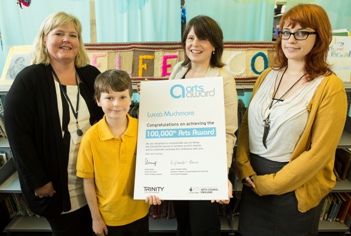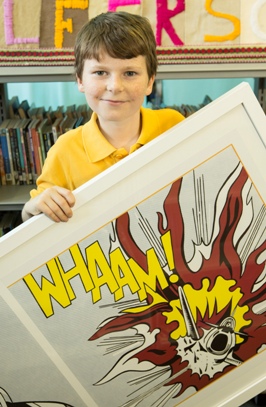News Release 15 October 2013
Arts Award celebrates its 100,000th award as impact study findings highlight clear advantages of Arts Award to young people’s development
A talented young Londoner has just been named by Trinity College London as the 100,000th person to have achieved an Arts Award – the unique national qualification that supports young people to develop their artistic and leadership talents.
This news comes hot-on-the-heels of some encouraging early findings from the first year of the Arts Award Impact Study, a three-year academic study into the impact of Arts Award on young people’s lives.
The proud recipient of the 100,000th Arts Award is 11-year-old Lucca Muchmore from Telferscot school in Balham, who has amazed his teachers and inspired fellow pupils with his infectious enthusiasm for mono-printing and digital illustration. As part of his Bronze Arts Award Lucca created his own website and a range of mono-printing graphics, led workshops at school and at home to pass his skills on to others and created a wonderful scrapbook of how heroes and events have influenced his work, including Lichtenstein in particular.
Lucca, who was presented with a 100,000th congratulations letter and a Lichtenstein print at his school last week by Trinity College London and Arts Council England, told us: ‘It was really good and fun to work towards my Arts Award- you can choose to do anything and make it work in any way. I think that doing Arts Award has changed me because before I wasn't as good at art as I am now and I’ve learned new skills and experience. I feel more confident in myself generally - not just in art.’
 |
Lucca’s experience is not unusual. The Arts Award Impact Study shows that some of the key benefits of Arts Award include encouraging the development of leadership and peer tutoring skills in young people as well as fostering independent learning. The programme also encourages metacognition, allowing reflection on what’s been learned and the ability to provide non-text based evidence, through video material, for example, which was part of Lucca’s portfolio of evidence. The mix of activity undertaken for Arts Award leads to achievements in communication, creativity and leadership skills and is what makes the award a unique qualification.
Professor Mick Waters from the University of Wolverhampton says: ‘The arts are fundamental to the human spirit and absolutely essential for developing the communication skills that are becoming increasingly important for success in 21st century life. Every child has a right to see the world through the perspective of the arts – just as societies have done throughout civilisation. Arts Award helps those responsible for teaching and learning to structure and manage experiences that fit in with children and young people’s maturing perceptions of society and their aspirations for their role within it.’
Professor Andrew Burn of the Institute of Education, University of London, agrees. ‘This landmark testifies to the extensive work Arts Award has accomplished in evidence-based recognition of young people's creative achievements,’ he says. ‘Arts Award has provided motivation, opportunities to reflect on learning, and tangible examples of artistic excellence which often go unrecognised by formal assessment structures.’
Meanwhile Lucca and his family are celebrating his achievement, and looking forward to a creative and successful future. His Mother, Bella, told us: ‘We are very proud of Lucca for finding his creative talents, working hard and gaining more inner confidence. When Lucca started in the process he had no idea where he would end up and now he is ambitious about continuing his artistic journey. Arts Award has given him much more than a certificate.’
 |
Trinity College London believes that Arts Award plays an increasingly significant role in supporting arts and cultural education and school improvement. It puts teaching staff and individual young people in the driving seat, and has a quality assurance process underpinning it to ensure it meets a national standard.
The government-commissioned independent review of Cultural Education in England recommended that most young people should be offered the opportunity to take part in Arts Award: a valuable qualification.
Alice Young, Head of Arts Award at Trinity College London says: “Lucca is an exceptional young person and in my experience is in very good company. Since we launched Arts Award in 2005, we’ve seen first-hand the positive impact Arts Award has on young people’s educational attainment as well as supporting the development of confidence, communication and leadership skills - such an important foundation for personal growth.
‘Congratulations to Lucca and each and every young person, teacher and Arts Award adviser who have achieved so much over the last eight years. I look forward to another 100,000 young people taking part.’
Laura Gander-Howe, Director, Children, Young People and Learning at Arts Council England comments: ‘This is a fantastic milestone – not only for Arts Award and all of the young people who have achieved one of the 100,000 awards, but also for everyone who believes in the transformative role arts and culture can play in young people’s personal and educational development.’
Arts Award provides structure for arts, cultural and media activities and projects and can be offered flexibly as part of the curriculum within education and non-education settings.
For more information about Arts Award please visit www.artsaward.org.uk or call 020 7820 6178.
Images: Telferscot School photo Matthew Andrews copyright Arts Award, Trinity College London